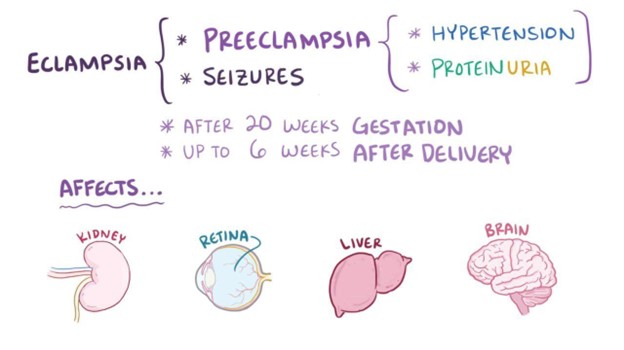Which compound would the nurse have readily available for a client who is receiving magnesium sulfate to treat severe preeclampsia?
Ferrous sulfate
Potassium chloride
Calcium carbonate
Calcium gluconate
The Correct Answer is D
Choice A Reason: This is incorrect because ferrous sulfate is an iron supplement that is used to treat or prevent iron-deficiency anemia. It has no effect on magnesium sulfate, which is a medication that lowers blood pressure and prevents seizures in severe preeclampsia.
Choice B Reason: This is incorrect because potassium chloride is an electrolyte supplement that is used to treat or prevent low levels of potassium in the blood. It has no effect on magnesium sulfate, which can cause hypermagnesemia, or high levels of magnesium in the blood.
Choice C Reason: This is incorrect because calcium carbonate is an antacid that is used to treat or prevent heartburn, indigestion, or calcium deficiency. It has no effect on magnesium sulfate, which can cause hypocalcemia, or low levels of calcium in the blood.
Choice D Reason: This is correct because calcium gluconate is an antidote that is used to treat magnesium toxicity, which can occur when magnesium sulfate is given in high doses or for prolonged periods. Calcium gluconate reverses the effects of magnesium sulfate on the neuromuscular and cardiovascular systems, such as muscle weakness, respiratory depression, cardiac arrhythmias, or cardiac arrest.

Nursing Test Bank
Naxlex Comprehensive Predictor Exams
Related Questions
Correct Answer is A
Explanation
Choice A Reason: This is correct because this description accurately reflects one of the main functions of amniotic fluid, which is to act as a shock absorber and buffer against external forces or movements that could harm the fetus. Amniotic fluid also allows the fetus to move freely and develop its muscles and bones.
Choice B Reason: This is incorrect because this description is false. The amount of amniotic fluid changes throughout the pregnancy, depending on the stage of fetal development and other factors. The normal range of amniotic fluid volume is between 500 and 1000 mL at term. Too much or too little amniotic fluid can indicate a problem with the fetus or the placenta.
Choice C Reason: This is incorrect because this description is false. The fluid is not mostly protein, but mostly water (about 98%). The water comes from the mother's blood plasma and the fetal urine. The remaining 2% of amniotic fluid consists of various substances, such as electrolytes, hormones, enzymes, antibodies, and fetal cells. Amniotic fluid does not provide nourishment to the fetus, but rather protects it from infection and helps regulate its temperature.
Choice D Reason: This is incorrect because this description is false. Amniotic fluid does not act as a transport mechanism for oxygen and nutrients, but rather as a barrier that prevents them from reaching the fetus directly. Oxygen and nutrients are delivered to the fetus through the placenta and the umbilical cord, which are connected to the maternal blood circulation.
Correct Answer is C
Explanation
Choice A: A clear liquid diet is not appropriate for a client with hyperemesis gravidarum, which is a severe form of nausea and vomiting during pregnancy that can lead to dehydration, electrolyte imbalance, and weight loss. A clear liquid diet does not provide adequate calories, protein, vitamins, or minerals for the client and the fetus.
Choice B: Administration of diethylstilbestrol is not indicated for a client with hyperemesis gravidarum. Diethylstilbestrol is a synthetic estrogen that was used in the past to prevent miscarriage and premature birth, but it was found to cause serious adverse effects such as vaginal cancer, infertility, and birth defects in the offspring.
Choice C: Total parenteral nutrition is the correct choice because it provides a complete and balanced source of nutrients through a central venous catheter. It is used for clients who cannot tolerate oral or enteral feeding due to severe gastrointestinal disorders such as hyperemesis gravidarum. It helps to prevent malnutrition, dehydration, and ketosis in the client and the fetus.
Choice D: Nothing by mouth is not a suitable option for a client with hyperemesis gravidarum. It can worsen the condition by causing starvation, acidosis, and ketosis. It can also increase the risk of aspiration pneumonia if the client vomits.
Whether you are a student looking to ace your exams or a practicing nurse seeking to enhance your expertise , our nursing education contents will empower you with the confidence and competence to make a difference in the lives of patients and become a respected leader in the healthcare field.
Visit Naxlex, invest in your future and unlock endless possibilities with our unparalleled nursing education contents today
Report Wrong Answer on the Current Question
Do you disagree with the answer? If yes, what is your expected answer? Explain.
Kindly be descriptive with the issue you are facing.
